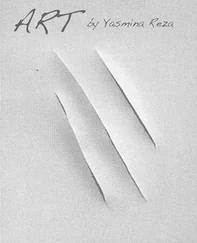* * *
I lost my mother a week ago. I was there. She raised one shoulder, as if something was bothering her, and then nothing more happened. I called to her. I called several times. And there was nothing more. My friend Lambert told me that his mother had asked him recently, “How old are you?”
“Seventy, Momma.”
“Seventy years old!” his mother exclaimed. “You deserve to be an orphan by now, my boy!”
Jeanne and I emptied the apartment last weekend. Two tiny rooms at Boulogne-Billancourt. A free cleanout service came to take away the furniture and the kitchen equipment. And all the objects—wooden pig, plaster cat, candlesticks, the Provençal doll, glass paperweights, bud vases—that we tossed into the trash bags. In fact, almost everything, except for the contents of a few drawers and the clothing. And the mushroom-shaped nutcracker I made in a high school woodworking shop fifty years ago, found among other knickknacks in a badly battered shoebox from the André shops. I would never have imagined the thing still existed. Jeanne didn’t remember it, she refused to believe I’d made it. From a storage sack stuffed in the rear of a closet we pulled crocheted placemats, cro-cheted pillow covers, the crocheted patchwork afghan spread that used to cover our parents’ bed, all of which for some incomprehensible reason we had spared from the truck. Our mother was the champion of crochet. After she retired, she had nothing but that to do. Errands, TV, the needles and hooks in front of the TV. Before she was even walking, Jeanne’s daughter was crawling around in crocheted diaper covers and little skirts. What shall we do with these? Jeanne asked.
“We can give them to some charity.”
“Who’d want them?”
“We should’ve dumped them with the rest of the stuff.”
“Yes.”
“And the clothes too.”
“Yes.”
The clothing was carefully hung, pressed tight into a narrow wardrobe. Till the very end, even totally bedridden, she insisted on being presentable . She would say, “I’m afraid they’ll find me dead and dirty.” The dirty old lady, that’s what I dread. We pulled out blouses, cardigans, the winter coat. We laid them on a three-level step stool, the single leftover from the stripped house. We knew it all by heart. We’d seen it all for years. Outfits out of fashion, out of season. The wardrobe of an ordinary woman who lives quietly, goes off to work, comes home from work, keeps a proper household, never even conceived of committing the least friskiness, not in appearance or perhaps in anything else—but as to that, who can say. Jeanne and I knew every item in the armoire since almost forever, she was wearing them already back in Puteaux, the same rough woolens, the same matching sets, mostly deep green trimmed in beige, the polyester bathrobe less aged but still seen for years.
Nicely folded in a corner there were the silk scarves we’d given her when scarves were in fashion, we’d kept giving her new ones in pleasing colors, without noticing that she never wore the earlier ones. They were wrapped in tissue-paper dustcovers. Jeanne took one and wrapped it around her head, meaning to do her Audrey Hepburn. I said, “So when does Ramadan start?” We laughed and a weird kind of sorrow rose in my throat in that tiny empty flat where just about nothing was left of an entire life. Fat Anicé had felt obliged to accept the doily. She’d said, “As a keepsake, sure,” with the gesture of a good girl doing a service. She could have pretended to be touched or to admire the work, but no, she stuck it into the bottom of her bag like a meaningless thing. I’m mad at myself for giving it to her. A woman crochets her whole life long and leaves some bits of craft that are no use to anyone. She would invent patterns but nobody cared. Who’s interested in crochet patterns? Death carries everything off, and that’s good. Got to make room for the newcomers. In our family we carried this to extremes. The biblical model—this father begat that one who begat etcetera— not in our house. On neither side. I knew none of my grandparents except for my father’s mother, the widow of a railroad man, a woman who loved nothing but the birds she overfed on her windowsills.
* * *
The apartment upstairs is still sealed. The yellow tape and the two wax seals are still on the door. From time to time I go up, on purpose to see. What happened here has gradually wafted away, the air is as it was before, I lean out over the railing of my balcony and there’s nothing but the ordinary scene: the privet hedges, the shrubs in their basins, the cars parked between the freshly painted lines. I used to see the Manoscrivis go by in that parking area. I would see them climb into the Laguna station wagon, she always at the wheel when they were together. He would finish his cigarette before getting in, she had time to back out of the space.
* * *
Eighteen people came. I had prepared for twice that many. Pals from forever, some colleagues of Pierre’s, Jeanne and her ex-husband, my niece, the Manoscrivis, my girlfriends from Pasteur or from Font-Pouvreau with or without boyfriends, and also, though he didn’t stay long, Emmanuel. No sooner did Jeanne arrive, carrying a homemade orange cake as if she were bringing a tub of caviar, than she rushed into the kitchen to wrap the cake in a towel and shove it hard into the fridge. I saw immediately that she was in one of those elated moods that exhaust me. My sister has completely unstable mood swings. She can change from one hour to the next, even less. The bad mood is radical, a state of gloom, almost silent and somewhat pleasant. But the good mood is worse. She sings under her breath, a show of good cheer with girlish flourishes and determinedly silly inflections. She was beginning a secret affair with a picture-framer. In the euphoria of the start-up, she had just bought herself an S&M leash and collar. She insisted on drawing me aside to show me the kit on her cellphone. She also wanted to get hold of a small whip, she’d seen a very nice one on the Internet, a knout with four tails on a crocodile handle. But it cost fifty-four euros and the site said “Beware! This object is VERY painful!” I asked to see what the framer looked like but she didn’t have a picture of him. He was sixty-four, five years older than she, married, arms thick and muscular from rowing, she said, and tattooed. I thought, So how come no tattooed guy with a whip turns up in my life? I felt finished, out of the game, fit for putting together little suburban parties with family and ultra-conventional folks. I’m irritated with myself for thinking that way. I’m happy with my husband. Pierre is cheerful, easy to live with. Not overtalkative—I don’t go for talkative. He is at my disposition without being a pushover or submissive. He’s loving. I like his skin. We know each other inside out. I object to his too-unconditional love. He doesn’t put me in danger. He doesn’t magnify me. He loves me even when I look bad, which is not at all reassuring. There’s no electricity between us; was there ever? What a pitiful inventory! I’m the fir tree in that Hans Christian Andersen story: If only something more alive, more intoxicating, would come along! No matter the forest, the snow, the birds, the hares—the fir tree takes no pleasure in any of all that, all it wants is to grow, to be tall enough to view the world. When it has finally grown tall, it dreams of being cut down and carried off by the loggers to become a ship’s mast and travel the seas; when its branches have grown out full enough, it dreams of being cut down and carried off to become a Christmas tree. The fir tree languishes, dying of desire. In the heated parlor, as it is being trimmed and decorated, hung with garlands of sweets, a star set on its top, it dreams of evening-time and candles on its branches, it dreams that the entire forest will come to press against the windowpanes in envy. Later, alone in the attic, stripped naked, its needles dropping off in the dry winter chill, it takes heart in looking forward to the return of springtime and the outdoors. When it is out in the courtyard, sprawling withered among fresh sprouting flowers, it longs for its old dark attic corner. When the hatchet and the match come along, it thinks of the old summer days, back in the forest.
Читать дальше

![Ясмина Сапфир - Охотница и чудовище [СИ]](/books/35157/yasmina-sapfir-ohotnica-i-chudoviche-si-thumb.webp)
![Ясмина Реза - Бог резни [=Бог войны]](/books/63616/yasmina-reza-bog-rezni-bog-vojny-thumb.webp)
![Ясмина Реза - Бог войны [=Бог резни]](/books/63617/yasmina-reza-bog-vojny-bog-rezni-thumb.webp)








